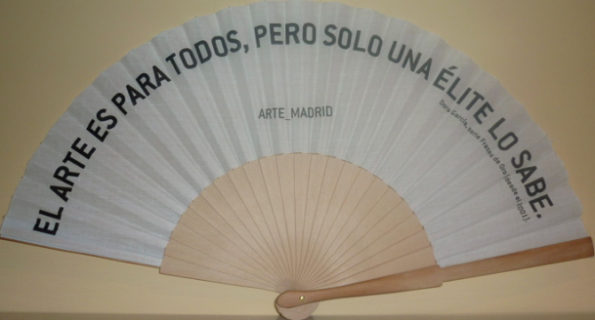Search
To search for an exact match, type the word or phrase you want in quotation marks.
A*DESK has been offering since 2002 contents about criticism and contemporary art. A*DESK has become consolidated thanks to all those who have believed in the project, all those who have followed us, debating, participating and collaborating. Many people have collaborated with A*DESK, and continue to do so. Their efforts, knowledge and belief in the project are what make it grow internationally. At A*DESK we have also generated work for over one hundred professionals in culture, from small collaborations with reviews and classes, to more prolonged and intense collaborations.
At A*DESK we believe in the need for free and universal access to culture and knowledge. We want to carry on being independent, remaining open to more ideas and opinions. If you believe in A*DESK, we need your backing to be able to continue. You can now participate in the project by supporting it. You can choose how much you want to contribute to the project.
You can decide how much you want to bring to the project.

In 2007 Ferran Adrià and his then restaurant el Bulli were invited to participate in the Documenta 12 in Kassel. His selection amongst the list of artists for one of the most important art events took more than a few in the art world by surprise (particularly those scandalized by the quotas of national representation, I even ask myself how it’s possible that the curator Roger-Martin Buergel, at the invitation of Macba, could have come to the conclusion that the only thing that interested him in the Barcelona art scene was a good meal in a remote restaurant on the Cap de Creus, already a demonstration of the cosmopaletisme that Eudald Camps talked about a few days ago). In the world of haute cuisine they were also left stunned by the choice, but in the opposite sense: finally it was considered art. But the person who was more surprised than anybody was Ferran Adrià. He didn’t see how he could participate, he didn’t see himself shifting his restaurant to the distant city of Kassel, nor preparing plates in public, or exhibiting photographs of his dishes (though later he has done and one can currently visit at the Somerset House in London the same exhibition about el Bulli that was on show a year ago at the Palau Robert in Barcelona). So his solution was Solomonic: el Bulli would carry on doing exactly the same during the 100 days of the Documenta, their participation would be this, as well as inviting each day two visitors of the event, chosen at random, to an evening meal, a flight to Gerona, a night in a hotel and the return to Kassel with a full stomach. They say there was little left to chance and that in reality the curator of the Documenta chose the guests carefully.
The art centre Arts Santa Mònica is now presenting the last exhibition of the current team (aside from any criticism of this exhibition or the programme, we insist that it’s time the Consellería de Cultura explained its motives and specified their plan for the arts and culture), an exhibition in which cooking is once again the protagonist: “El somni” (The dream). This time it’s the turn of the Roca brothers, owners of the recently awarded best restaurant of the world el Celler de Can Roca. Inevitably what stands out is the luck or astuteness of programming the Roca brothers to coincide with all the media coverage (at least in Catalonia) of the prize. Unlike Ferran Adrià, the Roca brothers do cook in the art centre, in the exhibition. But they will cook for a select group of twelve guests that here, without any excuses, are handpicked. They are eminences from different areas: from the philosopher Rafael Argullol, the biologist Ben Lehner, to Miquel Barceló and Ferran Adrià (the referent). The proposal forms part of a sensorial opera directed by Franc Aleu. As far as I have understood, these twelve eminences will transmit to the rest the subtleties of the experience.
As the foolish doorman says in the TV series “La que se avecina”, several things come to mind. The first is whether it is licit to allocate the funds and space of a public institution to invite a chosen few to an exquisite supper. Or if this exclusivity, the exclusivity of experience, instead form part of the current tendency, that a rampant neo-conservatism is taking advantage of under the excuse of the crisis, to establish constant class differences in the access to knowledge, education, culture and in the ultimate extreme, health. The proposal seems a bit like a version of one of those television programmes where they show the houses of the wealthy and explain how well one lives between Jacuzzis, views of the Bosphorus, servants and direct access from the parking to the lounge.
On the other hand, I recall Antonio Ortega disputing with Dora García over one of her golden sentences, the one that says “Art is for everyone, but only the elite knows it”, arguing that what happens with art is minority not elitist, and using a sporting simile compared it with the minority character of chess as opposed to the elitism of polo. Now it seems that reality is leaning towards proving Dora, rather than Antonio, right. And haute cuisine, with its aura of exclusiveness and its constant recurrence to the need for an elevated and cultivated sensitivity, is playing a determining role in this war. Where art practices insist on their elitist character, not just in their exclusive forms of presentation but even in the more popular ones showing what isn’t nor ever will be within our reach, that which despite being exhibited publicly is about an experience of possession that belongs to only a few marked by the line of security in the museums. One which shows, once again, as in the case of the Roca brothers in an art centre, the collusion of cultural producers with a model that has forgotten about culture and knowledge as public assets.

http://www.davidgtorres.net
"A desk is a dangerous place from which to watch the world" (John Le Carré)